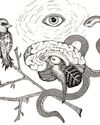
Conflict-of-duty remains one of the most intractable problems in moral philosophy. How to think about situations in which a person has two or more moral obligations, but can fulfill only one?
It was primarily to deal with this problem that W.D. Ross introduced the concept of prima facie duty in his signature essay ‘What Makes Right Acts Right?’, (chapter 2 of his 1930 book The Right and the Good) and . Prima facie means something like ‘on the face of it’ or ‘at first sight’. Philip Stratton-Lake claims that within twenty years of its appearance in 1930, Ross’s theory was old-hat and “rejected out of hand by most moral philosophers.” Nonetheless, his term ‘prima facie duty’ has remained part of the moral philosophical lingo. And if Ross’s theory is dated, apparently so is conflict of duty itself, as I found to my surprise when I Googled it and discovered that nearly all the references were to conflicts of interest.
In any case, conflicts of duty remain as vexatious as ever. Think of the infamous Trolley Problem introduced by Philippa Foot back in 1967. This hydra-headed monster keeps spawning new variations, and you can register your two-cents worth on some of these any time of the day or night, at moralsensetest.com. The Trolley Problem also features prominently in several episodes of the comedy series The Good Place.
Logical Maneuvers
This story is from the {{IssueName}} edition of {{MagazineName}}.
Start your 7-day Magzter GOLD free trial to access thousands of curated premium stories, and 9,000+ magazines and newspapers.
Already a subscriber ? Sign In
This story is from the {{IssueName}} edition of {{MagazineName}}.
Start your 7-day Magzter GOLD free trial to access thousands of curated premium stories, and 9,000+ magazines and newspapers.
Already a subscriber? Sign In

Anselm (1033-1109)
Martin Jenkins recalls the being of the creator of the ontological argument.

Is Brillo Box an Illustration?
Thomas E. Wartenberg uses Warhol's work to illustrate his theory of illustration.

Why is Freedom So Important To Us?
John Shand explains why free will is basic to humanity.

The Funnel of Righteousness
Peter Worley tells us how to be right, righter, rightest.

We're as Smart as the Universe Gets
James Miles argues, among other things, that E.T. will be like Kim Kardashian, and that the real threat of advanced AI has been misunderstood.

Managing the Mind
Roger Haines contemplates how we consciously manage our minds.

lain McGilchrist's Naturalized Metaphysics
Rogério Severo looks at the brain to see the world anew.

Love & Metaphysics
Peter Graarup Westergaard explains why love is never just physical, with the aid of Donald Davidson's anomalous monism.

Mary Leaves Her Room
Nigel Hems asks, does Mary see colours differently outside her room?

From Birds To Brains
Jonathan Moens considers whether emergence can explain minds from brains.